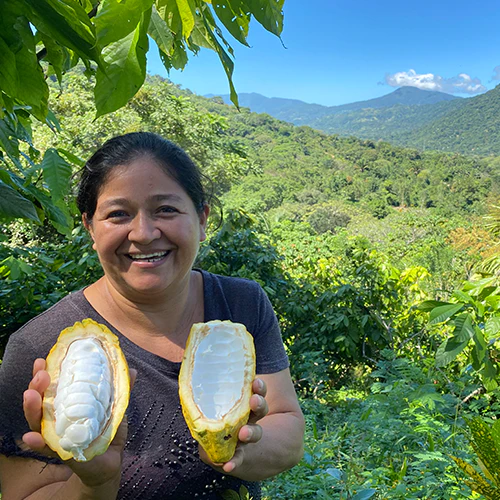Uncommon Cacao

Linking organic cacao farmers with specialty chocolate makers to maximize incomes
- Company
- Agriculture
- Latin America
- 2016
- Active
The challenge
Ninety percent of the world’s cocoa – the main ingredient in chocolate – is produced by smallholder farmers living under $2 a day. Despite a growing demand for premium chocolate, smallholder cacao farmers remain impoverished because the vast majority of profits from this nearly $100 billion booming global industry are going to big manufacturers and middlemen, rather than to producers. As a result of stagnant, low incomes, more and more farmers are either abandoning cacao for more lucrative crops, or producing poor-quality beans that must be sold at below market prices.
The innovation
Uncommon Cacao connects smallholder organic cacao farmers to specialty chocolate makers through direct, transparent relationships. Its “farmer-up approach” business model starts with buying fresh cacao beans directly from farmers, paying them a higher price than they would otherwise receive from selling into the non-premium cocoa supply chain. The company then oversees the fermentation and drying process to ensure the highest standards of quality and flavor are met for delivery to some of the world’s best new chocolate makers. By working directly with local producers and responsible exporters, Uncommon Cacao cuts out exploitative middlemen to drive maximum profits to farmers.
The impact
More than ninety percent of Uncommon Cacao’s farmer customers live on less than $2 a day. By buying transparently sourced, high-quality cacao beans directly from local farmers and cooperatives in order to sell to premium and craft chocolate makers worldwide, Uncommon Cacao is creating direct links between smallholder farmers and the global chocolate industry. By integrating them into a more equitable supply chain for premium cacao, Uncommon Cacao is enabling low-income farmers to stabilize and increase their incomes by more than 100%. The company aims to directly impact more than 10,000 farmers over the next three years, with an impact of nearly 50,000 lives.